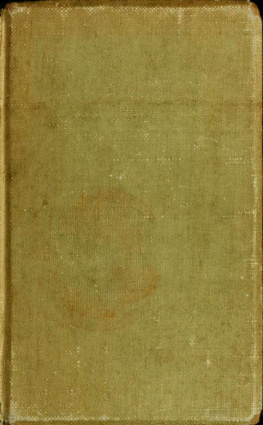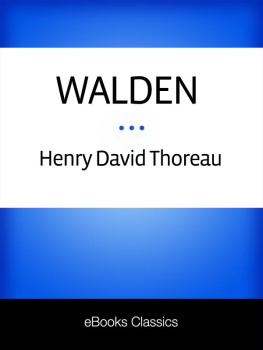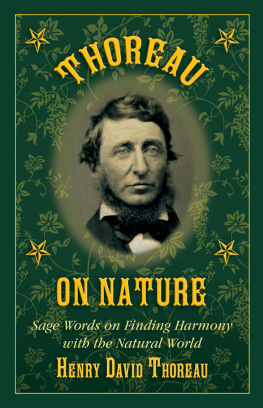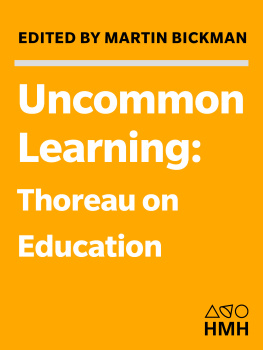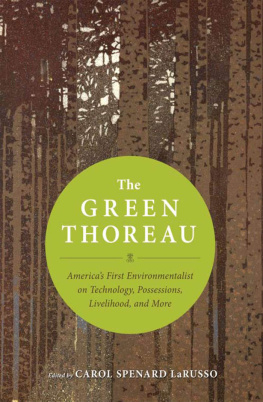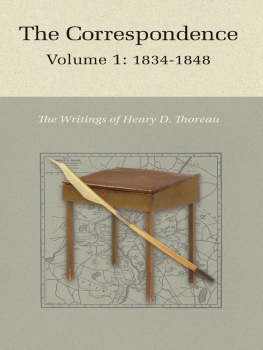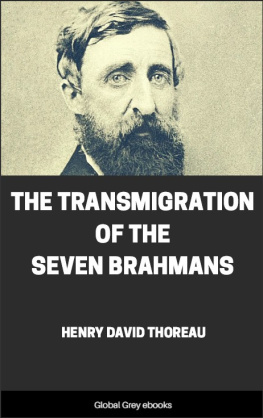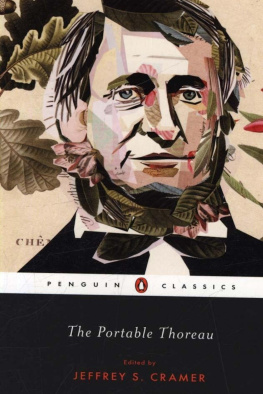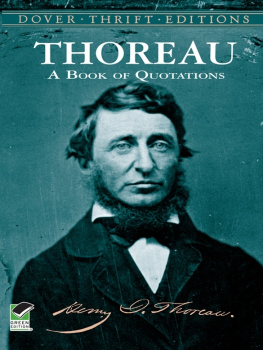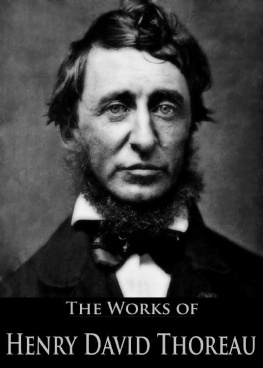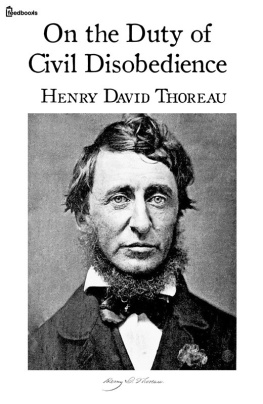Thoreau Henry David - Poems of Nature
Here you can read online Thoreau Henry David - Poems of Nature full text of the book (entire story) in english for free. Download pdf and epub, get meaning, cover and reviews about this ebook. genre: Science. Description of the work, (preface) as well as reviews are available. Best literature library LitArk.com created for fans of good reading and offers a wide selection of genres:
Romance novel
Science fiction
Adventure
Detective
Science
History
Home and family
Prose
Art
Politics
Computer
Non-fiction
Religion
Business
Children
Humor
Choose a favorite category and find really read worthwhile books. Enjoy immersion in the world of imagination, feel the emotions of the characters or learn something new for yourself, make an fascinating discovery.
- Book:Poems of Nature
- Author:
- Genre:
- Rating:3 / 5
- Favourites:Add to favourites
- Your mark:
- 60
- 1
- 2
- 3
- 4
- 5
Poems of Nature: summary, description and annotation
We offer to read an annotation, description, summary or preface (depends on what the author of the book "Poems of Nature" wrote himself). If you haven't found the necessary information about the book — write in the comments, we will try to find it.
Poems of Nature — read online for free the complete book (whole text) full work
Below is the text of the book, divided by pages. System saving the place of the last page read, allows you to conveniently read the book "Poems of Nature" online for free, without having to search again every time where you left off. Put a bookmark, and you can go to the page where you finished reading at any time.
Font size:
Interval:
Bookmark:





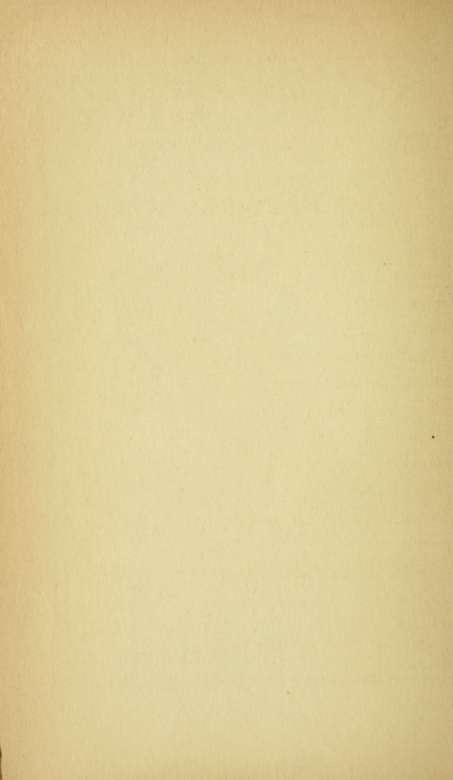
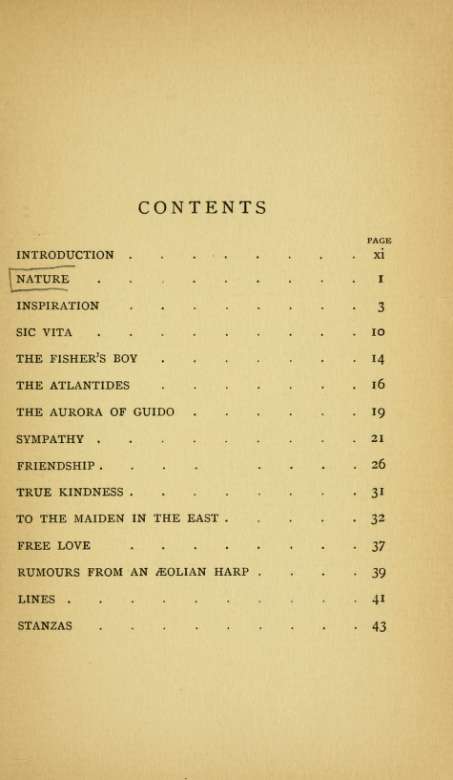
Blake, his literary executor. Most of Thoreau^s poems were composed early in his life, before his twenty-sixth year. ^Just nowj he wrote in the autumn of 1841, '/ am in the mid-sea of verses, and they actually rustle round me, as the leaves would round the head of Autumnus himself, should he thrust it up through some vales which I know; but^ alas ! many of them are but crisped and yellow leaves like his^ I fear^ and will deserve no better fate than to make mould for new harvests.^ After 1843 he seems to have written but few poems^ and had destroyed perhaps as many as he had retained^ because they did not meet the exacting requirements of his friend Emerson^ upon whose opinion at that time he placed great reliance. This loss was regretted by . Thoreau in after years^ whett the poetical habit had left him^ for he fancied that some of the verses were better than his friend had supposed. with some translations from the Greeks have lately been included by Thoreau's Boston publishers in their volume (?/ Miscellanies {vol, x. of the Riverside Edition, 1894). of the Riverside Edition, 1894).
But no collection so full as the present one has ever been offered to the public. It has not been attempted to make this a complete collection of Thoreau^s poems^ because, as has been well said, * many of them seem to be merely pendants to his prose discourse, dropped in as forcible epigrams where they are brief, and in other instances made ancillary to the idea just expressed, or to perpetuate a distinct conception that has some vital connection with the point from which it was poured forth. It is, therefore, almost an injustice to treat them separately at all.^ ^ After the discontinuance ^The Dial, Thoreau ceased to publish his verses as separate poems, but interpolated them, in the manner described, in his prose essays, where they form a sort of accompaniment to the thought, and from which it is in many cases impossible to detach them. That he 1 Article on ' The Poetry of Thoreau,' by Joel Benton. Lippin-CQtt's Magazine, 1886, himself set some value on them in this connection may be gathered fro?n a sentence in the last of his published letters^ in which he writes to a correspondent: '/ am pleased when you say that in The Week you like especially those little snatches of poetry interspersed through the book^ for these I suppose are the least attractive to most readers.^ Everything that concerns a great writer has its special interest; and Thoreau!s poetry^ whatever its intrinsic value may be, is full of personal significance ; in fact, as Emerson remarked, ^his biography is in his verses* Thus, many of these poems will be found to throw light on certain passages of his life, * Inspiration^ for example, is the record of his souVs awakening to the new impulse of transcendentalism; the stanzas on 'Sympathy* perhaps contain in a thinly disguised form the story of his youthful love, and the sacrifice which he imposed on himself to avoid rivalry with his brother; the lines ^ To my Brother* refer to the sudden and tragic death of John Thoreau in 1842 / and ' The Departure ' is believed to be the poem in which Henry Thoreau, when leaving in 1843 the home of Emerson^ where he had lived for two years^ took farewell of his friends. The numerous other allusions to the life and scenery of Concord^ with which Thoreatis own life was so closely blended, require no comfnent or explanation.
Thoreau^s view of the poetic character^ as stated by hi?n in The Week, is illustrative of his own position. ^ A true poem,' hej^u^lu-^dhtrngmsh^dmLM^^^^^n^ by^a felicitous expression, or any thought it suggests, as by the atmosphere which surrounds it. There are two classes of men called poets. The one cultivates life, the other art: one seeks food for nutriment, the other for flavor; one satisfies hunger, the other gratifies the palate.^ There can be~no doubt to which of these classes Thoreau himself belongs. If metrical skill be insisted on as an indispensable condition of poetry, he can hardly be ranked among the poets ; nor, where this criterion was dominant, was it surprising that, as one of his contemporaries tells us^ with reference to his verses in The Dial, ^ an unquenchable laughter, like that of the gods at Vulcan's ^ John Weiss, in the Christian Examiner^ 1865. limpings we7it tip over his ragged and halting linesJ But in the appreciation of poetry there is a good deal more to be considered than this; and^ as the same writer has remarked^ there is ' a frank and unpretending 7iohleness ' in many of Thoreau^s verses^ distifiguished as they are, at their best, by their ripe fulness of thought, quiet gravity of tone, and epigrammatic terseness of expression.
The title of poet could hardly be withheld fro7n the author of such truly powerful pieces as * The Fall of the Leaf^ ' Winter Memories^ 'Smoke in Winter^ or ''Inspiration.^ Nor should it be forgotten that Thoreau was always regarded as a poet by those who were associated with him. * Poet-Naturalist ' was the suggestive title which Ellery Channing applied to him; and Hawthorne remarked that * his thoughts seem to measure and attune themselves into spontaneous verse, as they rightfully may, since there is real poetry in them.^ Even Emerson^s final estimate was far fro?n unappreciative. ^ His poetry^ he wrote i?i his biographical sketch, * might be bad or good; he no doubt wanted a lyric facility and technical skill, but he had the source of poetry in his spiritual perception. His own verses are often rude and defective. The gold does not yet rtm pure is drossy and crude. The thyme and marjoram are not yet honey.
But if he want lyric fineness and technical 7fierits^ if he have not the poetic temperame7it^ he never lacks the causal thought^ showing that his genius was better than his talent.^ Perhaps what Thoreau said of Quarks, one of that school of gnomic poets of which he was a student, might be aptly applied to himself: ' It is rare to find one who was so much of a poet and so little of an artist. Hopelessly quaint, he never doubts his genius; it is only he and his God in all the world. He uses language sometimes as greatly as Shakespeare ; and though there is not much straight grain in him, there is plenty of rough, crooked timber.^ The affi^iity of Thoreau's style to that of Herbert, Donne, Cowley, a?id other minor Elizabethans, has often been remarked; and it has been truly said that the stanzas ^Sic Vita^ might almost have a niche in Herberfs Temple. It must be gra7i,i:'d, then, that Thoreaii, whatever his limitations^ had the poet's vision^ and sometimes the poefs divine faculty; and if this was manifested more frequently in his masterly prosey it was neither absent from his verse nor from the ivhole te?tor of his character. It was his destiny to be one of the greatest prose writers whom America has produced^ and he had a strong, perhaps an exaggerated, sense of the dignity of this calling. ' Great prose^ he thinks, ' of equal elevation, co?n-mands our respect more than great verse, since it implies a more permanent and level height, a life more pervaded with the grandeur of the thought.
Font size:
Interval:
Bookmark:
Similar books «Poems of Nature»
Look at similar books to Poems of Nature. We have selected literature similar in name and meaning in the hope of providing readers with more options to find new, interesting, not yet read works.
Discussion, reviews of the book Poems of Nature and just readers' own opinions. Leave your comments, write what you think about the work, its meaning or the main characters. Specify what exactly you liked and what you didn't like, and why you think so.

